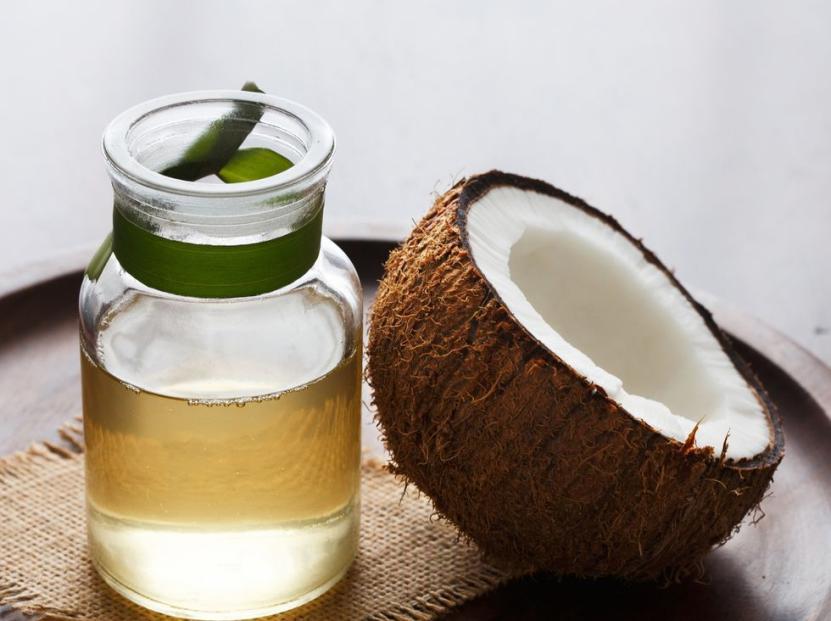MCT oil: everything you need to know

As one of the key ingredients in the viral Bulletproof Coffee trend, MCT oil is favoured in the fitness world among keto dieters, athletes and bodybuilders. It has gained wider prominence in recent years, partly due to the popularity and prevalence of coconut oil, which is considered a rich source of MCTs, otherwise known as medium-chain triglycerides.
But what happens in the body when you consume MCTs, and what are the purported health benefits? Is there a recommended dose for MCT oil? And, is regular supplementation associated with any adverse side effects?
We posed these questions and more to a nutrition expert and a nutritional scientist to find out whether it’s worth taking this well-known health supplement:
What is MCT oil?
Medium-chain triglycerides (MCTs) are a form of easily-digestible fats that occur naturally in certain foods, including coconut oil, palm kernel oil, whole milk and butter, explains Aisling Moran, nutritional scientist at Thriva. MCTs can also be extracted from food to create a supplement like MCT oil.
‘Most fats in your diet are long-chain triglycerides (LCTs),’ Moran says. ‘These have a tail of 13 to 21 carbon atoms.’ By contrast, MCTs have a tail of six to 12 carbon atoms. The main MCTs are caproic acid, which contains six carbons; caprylic acid, which contains eight carbons; capric acid, which contains 10 carbons, and lauric acid, which contains 12 carbons.
‘A lot of the possible benefits of MCTs don’t apply to lauric acid, because they behave more like LCTs,’ Moran explains. ‘There’s some debate as to whether lauric acid should be classified as an MCT. Many experts believe it should only include fats with 6-10 carbons.’
This is important, since coconut oil often is touted as a great source of MCTs. ‘But as it contains mostly lauric acid – about 47 per cent – many of the benefits related to MCTs don’t apply to commercial coconut oil,’ she continues.
What does MCT oil do?
Your body finds it easier to break down and absorb MCTs because of their shorter chain length. They go to your liver, where they can be used instantly for energy or turned into ketones. Ketones are only produced when your body is short on carbohydrates. This occurs overnight, during fasting, on when you’re on the keto diet – basically, any time there is not enough glucose to meet your body’s requirements.
‘Unlike other fatty acids, ketones can pass from your blood to your brain — which can act as an energy source for your brain,’ Moran explains. ‘Since MCTs can be used as an energy source first, it means they’re less likely to be stored as fat. Of course, if you have too much MCTs, they’ll eventually be stored as fat.’
Consuming MCTs in oil form means they’re absorbed faster than when consumed through food, says nutritionist Jenna Hope. ‘The oil also provides 100 per cent of MCTs whereas foods will contain less,’ she adds. ‘Although, foods containing MCTs are also rich in other nutrients and contain equally beneficial health supporting properties too.’
Is MCT oil good for you?
MCTs have been used for years to help treat malnutrition and conditions that cause food absorption issues, ‘including coeliac disease, liver disease, and bowel resections,’ says Moran. ‘They might also be used in the treatment of gallbladder disease, cystic fibrosis, and epilepsy.’
MCT oil benefits
Here, we take a look at other potential MCT oil benefits:
Weight loss
MCTs are almost 10 per cent lower in calories than LCTs – but that’s not the only reason MCT oil is commonly touted as a weight loss aid.
‘It’s been claimed that MCTs can help aid weight loss by increasing fullness and how many calories you burn, says Moran. ‘But research focusing on MCTs as a weight loss aid is very mixed. Some studies show that it might help aid weight loss, with the biggest benefit seen in men and people who started with a high amount of body fat. But even in these cases, the effects tended to be quite modest.
‘Other studies show no effect,’ she continues. ‘Many of these studies involve small sample sizes. And some haven’t accounted for other important factors, like how much you exercise or how many calories you eat – which hugely influence weight loss. So, in a nutshell, more research is needed before any recommendations can be made about using MCTs to aid weight loss.’
And it’s important to remember that even if MCTs do potentially help to improve satiety and stabilise blood sugar levels, the use of MCT oil alone will not stimulate weight loss, says Hope, ‘especially if MCT oils are used as an addition to the diet – they’re unlikely to promote a calorie deficit and in some cases may cause weight gain’.

Exercise performance
‘Some research shows that MCTs might help to increase exercise performance by improving your energy and endurance,’ says Moran. ‘But most of the research so far shows no benefit. More high-quality research is needed to understand this relationship better.’
Brain function
If you have Alzheimer’s disease, it can affect your brain’s ability to use sugar as an energy source, Moran says. MCTs offer your brain an alternative energy source: ketones. ‘Some research shows that it might help protect your brain in the early stages of Alzheimer’s disease, but these benefits only seem to be found in people with the APOE e4 gene variant,’ she explains.
Cholesterol
Some research shows that MCTs might help lower cholesterol levels, while other studies show the opposite. ‘Again, these studies tended to have small sample sizes and sometimes used coconut oil (high in lauric acid) as the source of MCTs,’ says Moran. ‘Plus, many of the findings come from animal studies. So, larger-scale human studies are needed to better understand the relationship between MCTs and cholesterol.’
Diabetes
MCTs might help to lower blood sugar levels and increase insulin sensitivity, says Moran, but again, this has only been demonstrated in studies using animals or small sample sizes. Additionally, some experts advise people with type 1 diabetes against taking MCTs, due to the increased risk of ketoacidosis.
‘Ketoacidosis caused by your diet is quite different from diabetic ketoacidosis,’ she continues. ‘Since this is still unclear, and due to the seriousness of ketoacidosis, if you have type 1 diabetes, it’s better to err on the side of caution.’
How to use MCT oil
If there are any benefits to be gleaned from taking MCT oil, it’s not yet clear what the optimum dose might be. ‘Most studies have tended to use between one and five tablespoons of MCT oil,’ says Moran. ‘If MCTs are being used in the treatment of certain medical conditions, a trained health professional will decide on the appropriate dose.’
MCT oil side effects
While MCT oil is are generally safe for most people, MCTs can sometimes cause diarrhoea, nausea, vomiting, and stomach discomfort, she continues. ‘If you do take them, starting with a low dose and taking them with food is recommended.’
They may also increase overall calorie consumption which in turn can lead to weight gain, says Hope. ‘Additionally, they can contribute to an increased risk of non-alcoholic fatty liver disease if dietary fats are over-consumed.’
MCT oil: the bottom line
‘Aside from their use to help treat conditions like malnutrition, research has a long way to go to support claims around the benefits of MCTs,’ says Moran. ‘Conflicting studies, small sample sizes, and lack of human studies mean we can’t draw any clinically-relevant conclusions yet.
‘It’s also really important to look at the bigger picture. For example, if you’re eating a highly-processed diet, MCTs won’t negate these effects. Many factors contribute to your health and your risk of developing chronic conditions. It’s important not to just focus on one thing.’
Pregnant women, diabetics, individuals with liver disease and other underlying health conditions should consult a health care professional before using MCT oil, adds Hope.
Last updated: 11-06-20
You Might Also Like
